
MING
明医 (MING):中文医疗问诊大模型
Stars: 697
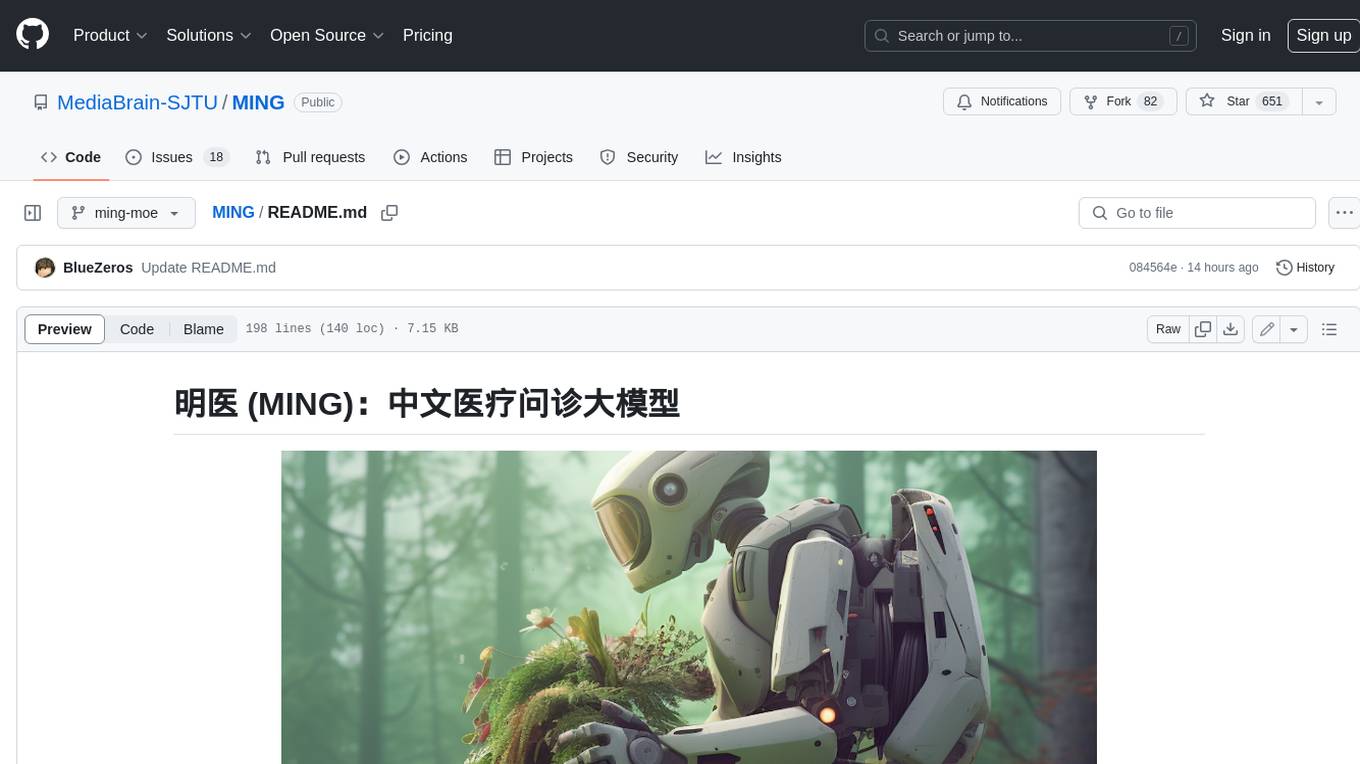
MING is an open-sourced Chinese medical consultation model fine-tuned based on medical instructions. The main functions of the model are as follows: Medical Q&A: answering medical questions and analyzing cases. Intelligent consultation: giving diagnosis results and suggestions after multiple rounds of consultation.
README:
本项目开源了基于医疗指令微调的中文医疗问诊模型:明医 (MING)。目前模型的主要功能如下:
 |
 |
医疗问答:对医疗问题进行解答,对案例进行分析。 |
智能问诊:多轮问诊后给出诊断结果和建议。 |
-
MING-MOE技术报告
-
基于多智能体交互的大语言模型多轮问诊自动评估框架
Automatic Interactive Evaluation for Large Language Models with State Aware Patient Simulator
-
🔥 [2024/04/14] 开源了基于Qwen1.5指令微调的专家混合模型MING-MOE
-
[2024/03/14] 开源了基于Qwen1.5-1.8b指令微调的MING-1.8B
-
[2023/07/25] 开源了基于bloomz-7b指令微调的MING-7B
-
[2023/07/25] MedicalGPT-zh更名为MING
模型 |
基座 |
HuggingFace |
| MING-7B | bloomz-7b1-mt | 🤗MING-7B |
| MING-1.8B | Qwen1.5-1.8B | 🤗MING-1.8B |
| MING-MOE-1.8B | Qwen1.5-1.8B | 🤗MING-MOE-1.8B |
| MING-MOE-4B | Qwen1.5-4B | 🤗MING-MOE-4B |
| MING-MOE-7B | Qwen1.5-7B | 🤗MING-MOE-7B |
| MING-MOE-14B | Qwen1.5-14B | 🤗MING-MOE-14B |
-
配置环境(测试环境如下,具体版本可以根据实际需求配置)
- python==3.9.16
- pytorch==2.0.1+cu117
- peft==0.9.0
-
安装项目依赖
git clone https://github.com/MediaBrain-SJTU/MING cd MING pip install -e .
-
下载模型参数并运行(要求单卡显存 >= 15G)
- MING-MOE
CUDA_VISIBLE_DEVICES=0 python -m ming/serve/cli.py \ --model_path {path_to_checkpoint} \ # 模型路径 --model_base {path_to_base_model} \ # 基座模型路径 --max_new_token 3072 # 输出最大长度- MING-1.8B
CUDA_VISIBLE_DEVICES=0 python -m ming/serve/cli.py \ --model_path {path_to_checkpoint} \ # 模型路径 --max_new_token 2048 # 输出最大长度- MING-7B
CUDA_VISIBLE_DEVICES=0 python -m ming/serve/cli.py \ --model_path {path_to_checkpoint} \ # 模型路径 --conv_template bloom \ # prompt --max_new_token 512 \ # 输出最大长度 --beam_size 3 \ # beam search宽度 --temperature 1.2 # 采样温度- 注:由于transformers库的问题,当beam-size > 1时,需要满足temperature>=1.0,否则会报错。
-
命令行运行实例
-
对话支持多轮
-
对话中输入关键词
new chat能够开启新一轮对话。
-
本项目由上海交通大学未来媒体网络协同创新中心和上海人工智能实验室智慧医疗中心合作研发。模型数据系统主要由廖育生,江书洋,刘泓呈,孟昱同完成,指导教师为王钰副教授。
预训练模型是基于大量语料库和算法模型进行训练的,并且在训练过程中可能存在偏差、错误和不完整的信息。因此,本项目提供的预训练模型仅供参考和研究使用,并不能保证其准确性和可靠性。使用预训练模型产生的结果可能存在误差和偏差,不能用于实际应用或决策。本项目不对使用预训练模型所产生的结果承担任何责任,也不对因使用预训练模型所产生的任何损失承担责任。使用者在使用预训练模型时应自行承担风险并进行自我验证。
如果你使用了本项目的数据或者代码,请声明引用
@article{liao2024ming,
title={MING-MOE: Enhancing Medical Multi-Task Learning in Large Language Models with Sparse Mixture of Low-Rank Adapter Experts},
author={Liao, Yusheng and Jiang, Shuyang and Wang, Yu and Wang, Yanfeng},
journal={arXiv preprint arXiv:2404.09027},
year={2024}
}@misc{MING,
author={Yusheng Liao, Yutong Meng, Hongcheng Liu, Yu Wang, Yanfeng Wang},
title = {明医 (MING):中文医疗问诊大模型},
year = {2023},
publisher = {GitHub},
journal = {GitHub repository},
howpublished = {\url{https://github.com/MediaBrain-SJTU/MING}},
}For Tasks:
Click tags to check more tools for each tasksFor Jobs:
Alternative AI tools for MING
Similar Open Source Tools

MING
MING is an open-sourced Chinese medical consultation model fine-tuned based on medical instructions. The main functions of the model are as follows: Medical Q&A: answering medical questions and analyzing cases. Intelligent consultation: giving diagnosis results and suggestions after multiple rounds of consultation.
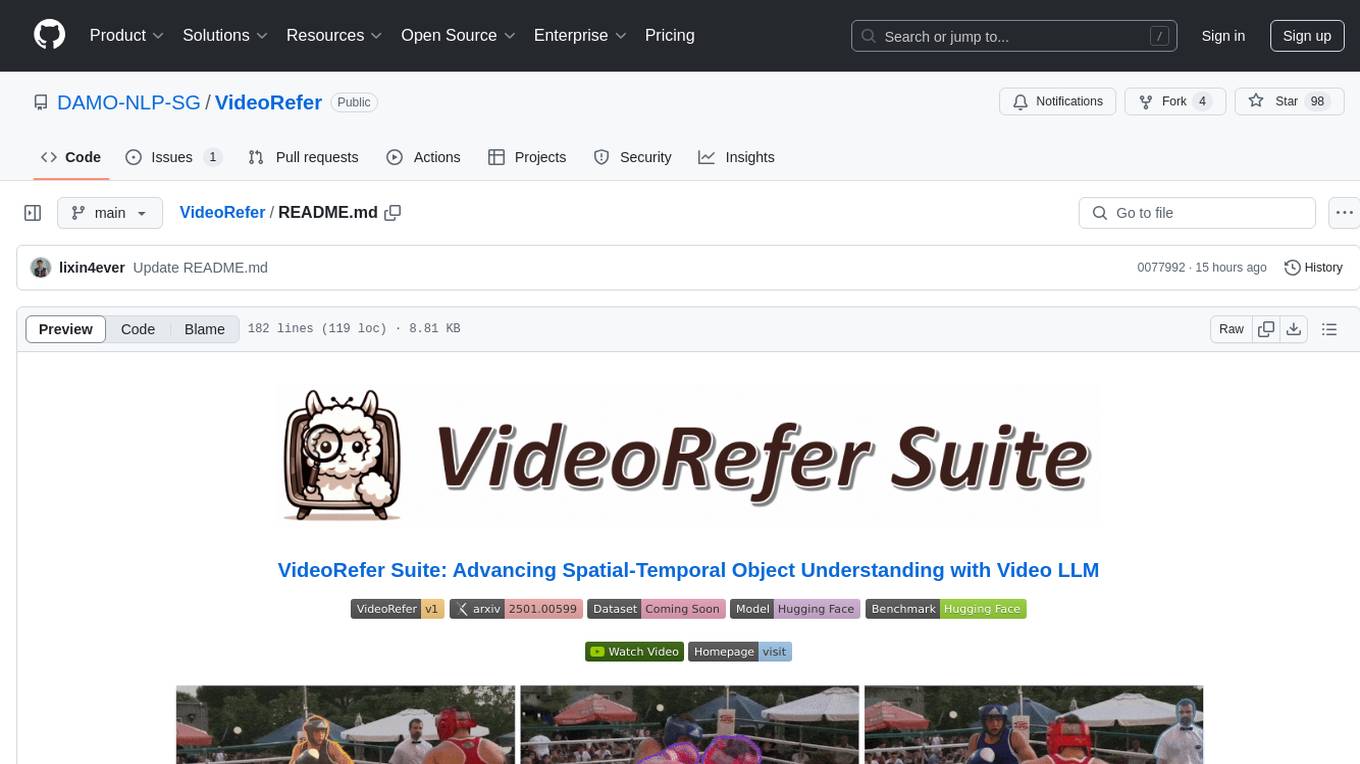
VideoRefer
VideoRefer Suite is a tool designed to enhance the fine-grained spatial-temporal understanding capabilities of Video Large Language Models (Video LLMs). It consists of three primary components: Model (VideoRefer) for perceiving, reasoning, and retrieval for user-defined regions at any specified timestamps, Dataset (VideoRefer-700K) for high-quality object-level video instruction data, and Benchmark (VideoRefer-Bench) to evaluate object-level video understanding capabilities. The tool can understand any object within a video.
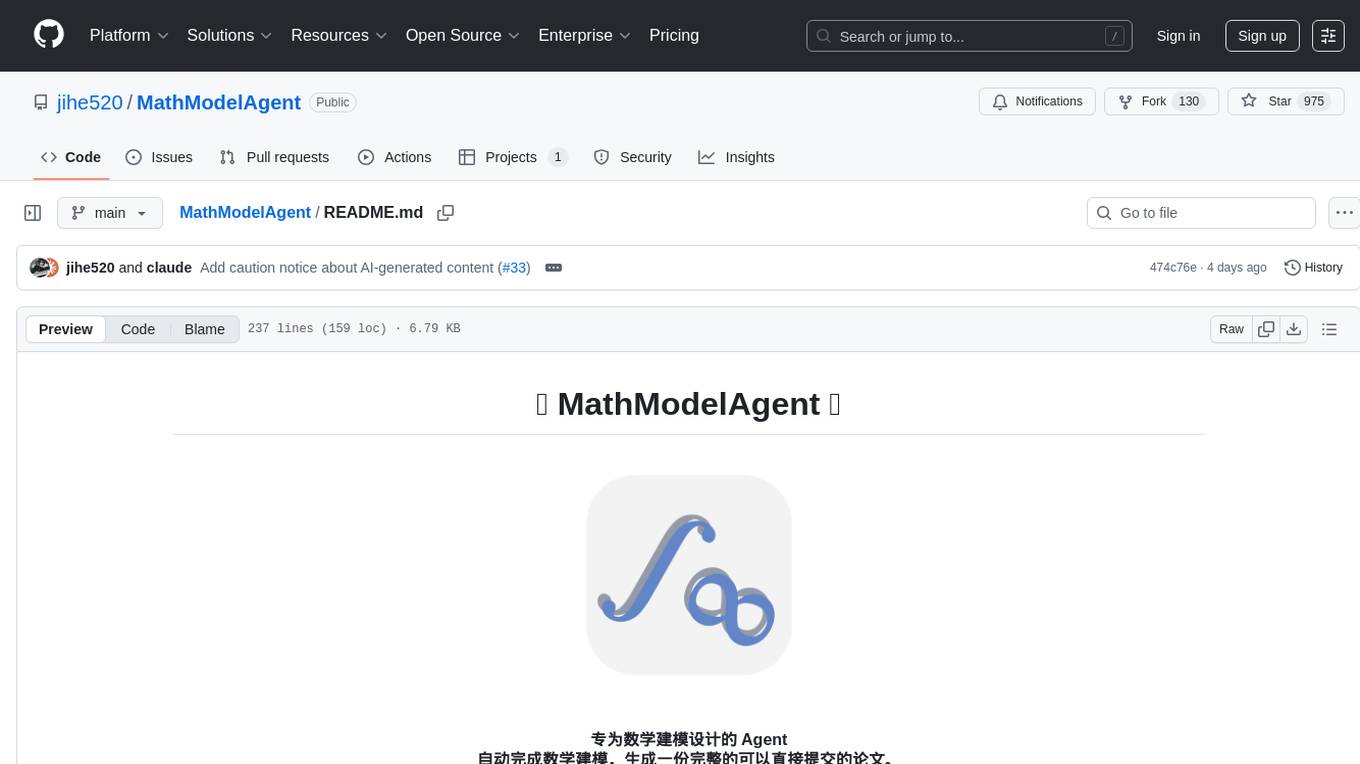
MathModelAgent
MathModelAgent is an agent designed specifically for mathematical modeling tasks. It automates the process of mathematical modeling and generates a complete paper that can be directly submitted. The tool features automatic problem analysis, code writing, error correction, and paper writing. It supports various models, offers low costs, and allows customization through prompt inject. The tool is ideal for individuals or teams working on mathematical modeling projects.
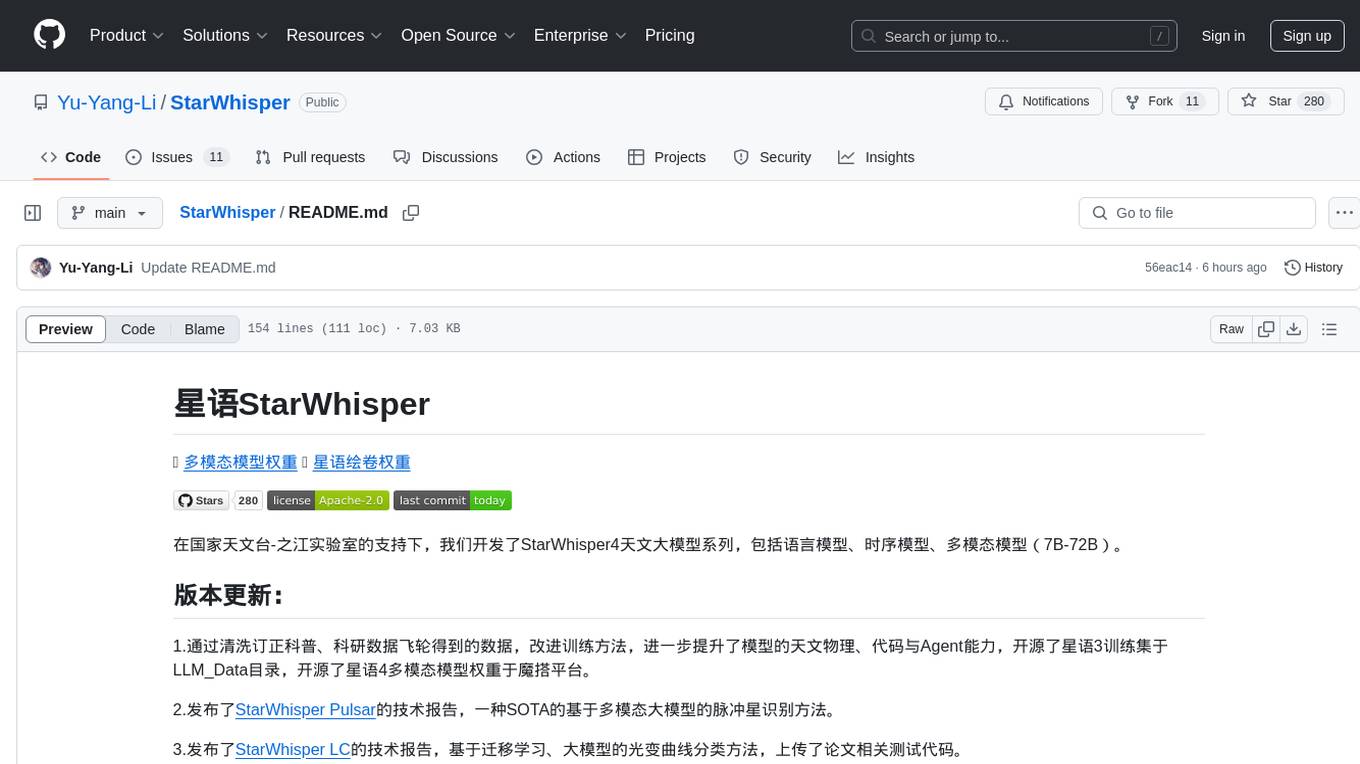
StarWhisper
StarWhisper is a multi-modal model repository developed under the support of the National Astronomical Observatory-Zhijiang Laboratory. It includes language models, temporal models, and multi-modal models ranging from 7B to 72B. The repository provides pre-trained models and technical reports for tasks such as pulsar identification, light curve classification, and telescope control. It aims to integrate astronomical knowledge using large models and explore the possibilities of solving specific astronomical problems through multi-modal approaches.
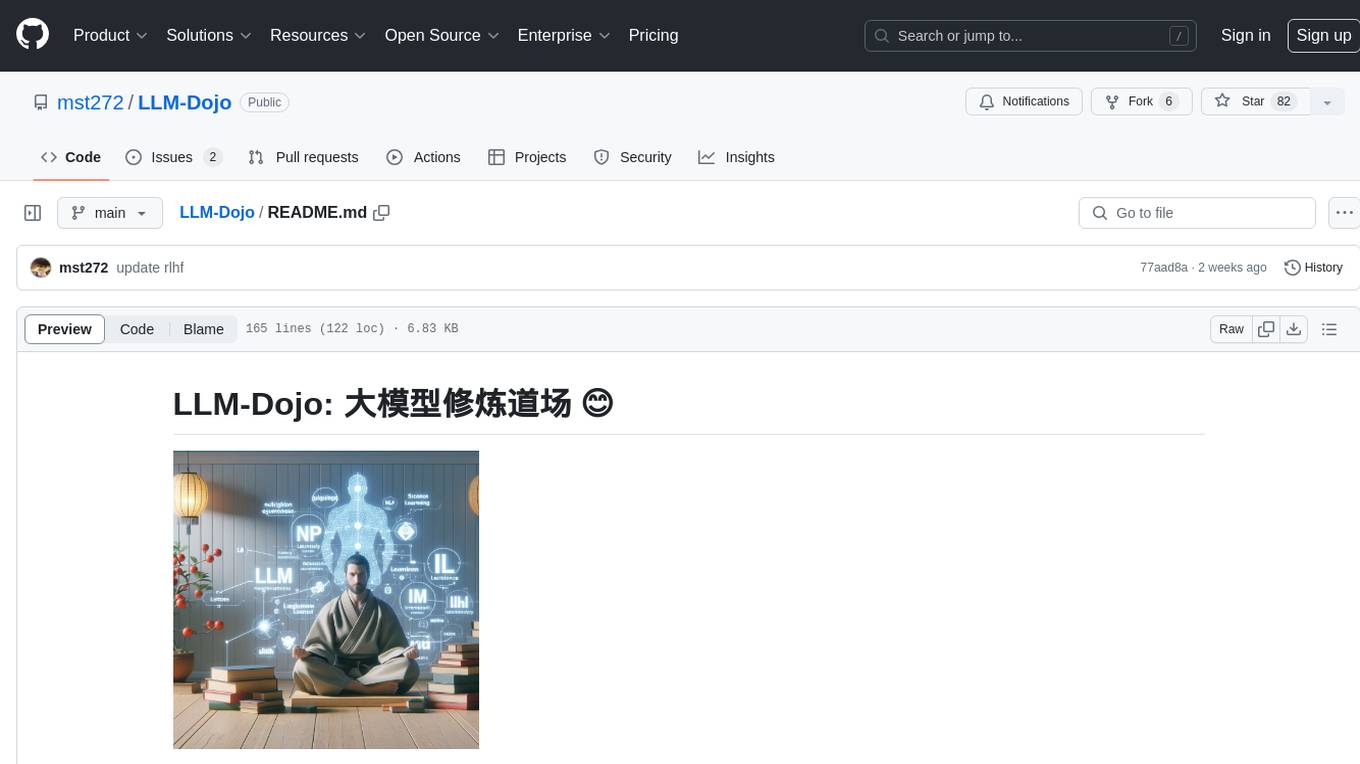
LLM-Dojo
LLM-Dojo is an open-source platform for learning and practicing large models, providing a framework for building custom large model training processes, implementing various tricks and principles in the llm_tricks module, and mainstream model chat templates. The project includes an open-source large model training framework, detailed explanations and usage of the latest LLM tricks, and a collection of mainstream model chat templates. The term 'Dojo' symbolizes a place dedicated to learning and practice, borrowing its meaning from martial arts training.
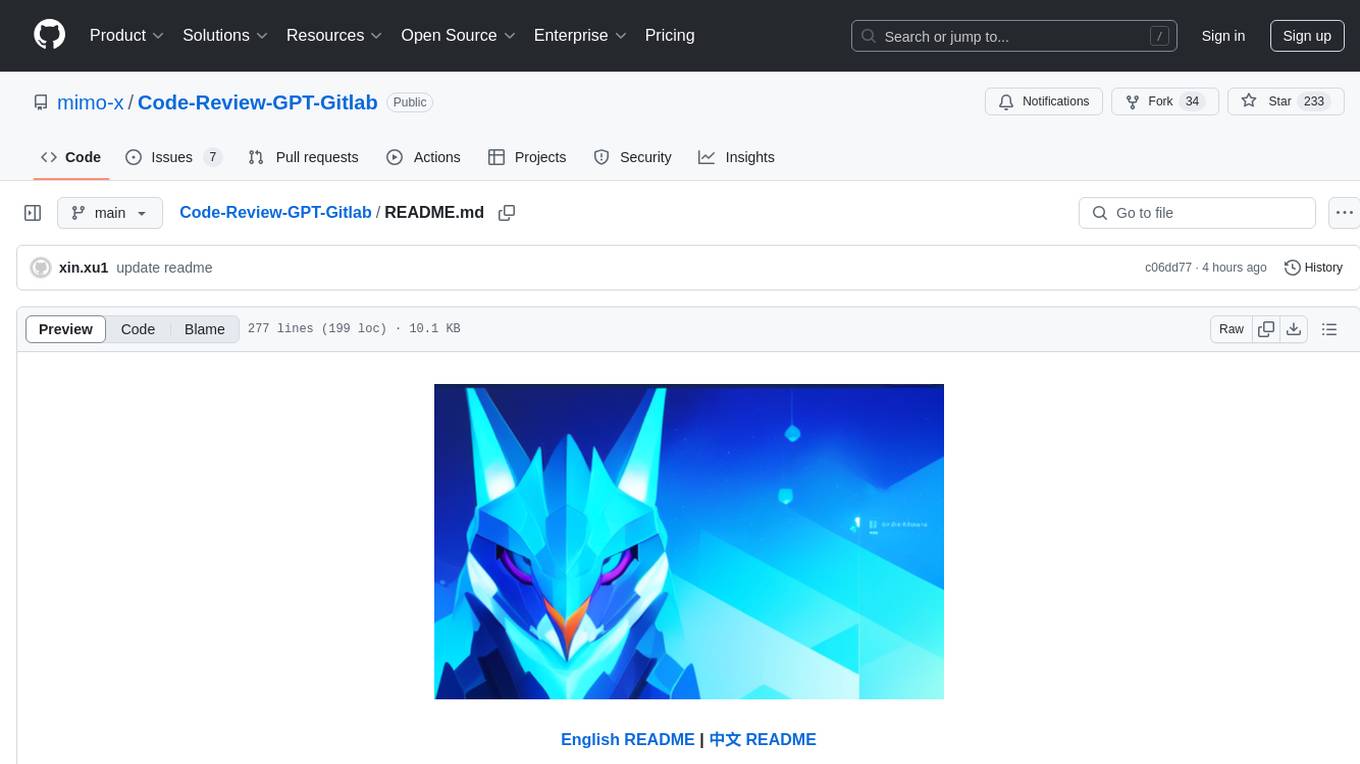
Code-Review-GPT-Gitlab
A project that utilizes large models to help with Code Review on Gitlab, aimed at improving development efficiency. The project is customized for Gitlab and is developing a Multi-Agent plugin for collaborative review. It integrates various large models for code security issues and stays updated with the latest Code Review trends. The project architecture is designed to be powerful, flexible, and efficient, with easy integration of different models and high customization for developers.
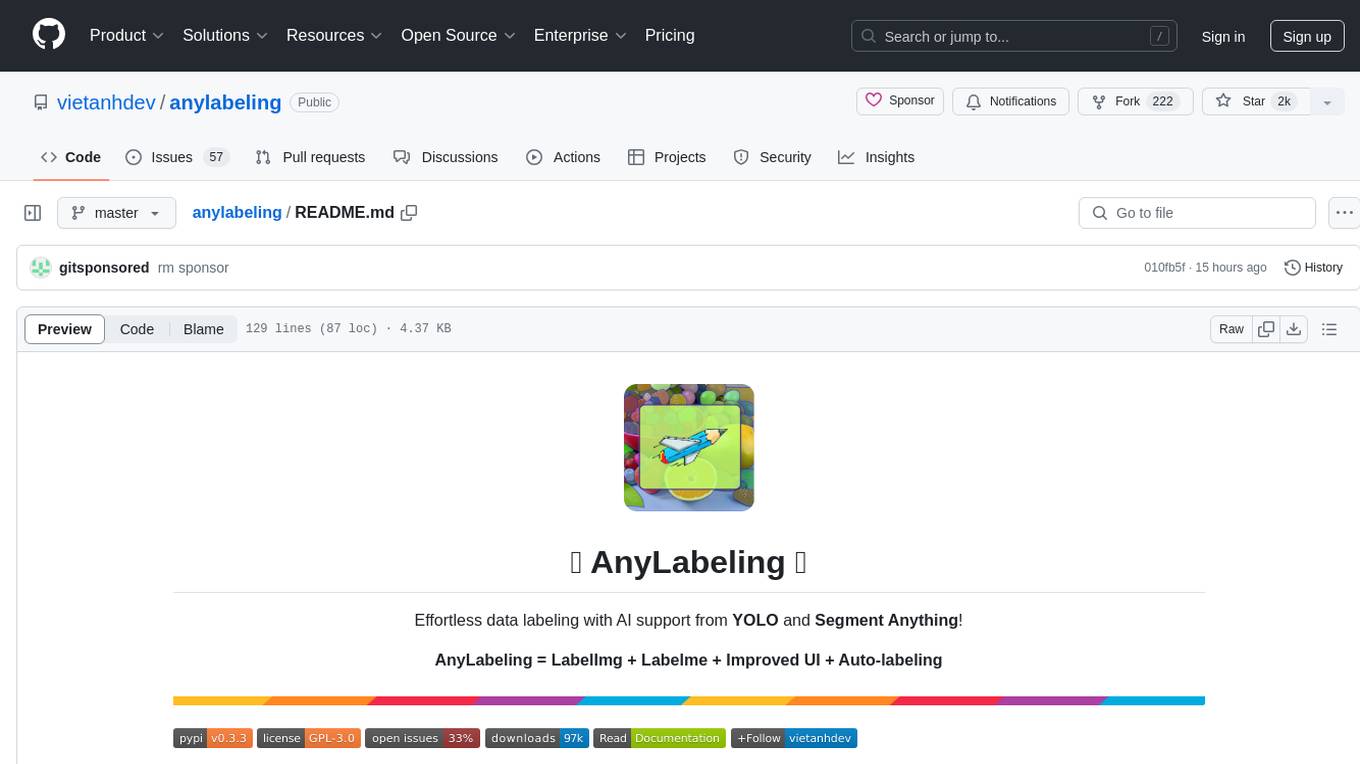
anylabeling
AnyLabeling is a tool for effortless data labeling with AI support from YOLO and Segment Anything. It combines features from LabelImg and Labelme with an improved UI and auto-labeling capabilities. Users can annotate images with polygons, rectangles, circles, lines, and points, as well as perform auto-labeling using YOLOv5 and Segment Anything. The tool also supports text detection, recognition, and Key Information Extraction (KIE) labeling, with multiple language options available such as English, Vietnamese, and Chinese.
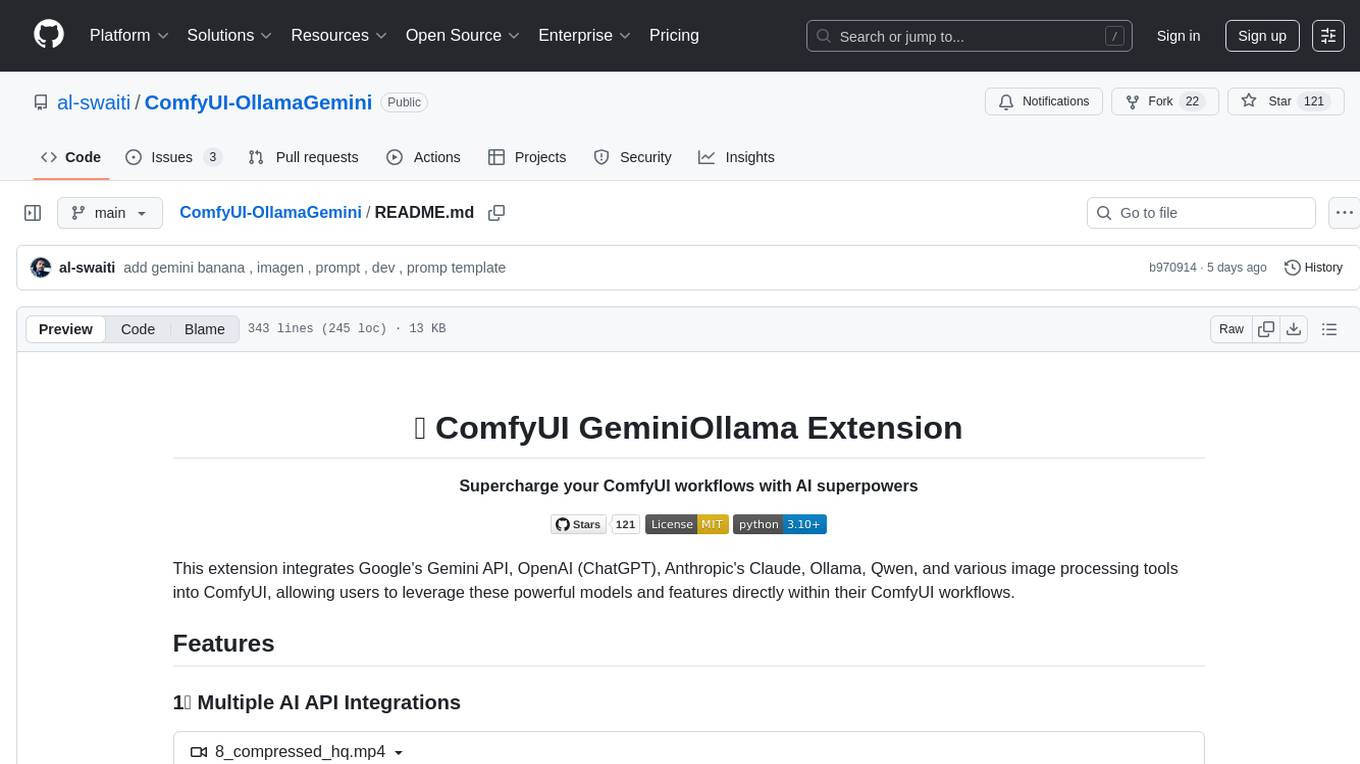
ComfyUI-OllamaGemini
ComfyUI GeminiOllama Extension integrates Google's Gemini API, OpenAI (ChatGPT), Anthropic's Claude, Ollama, Qwen, and image processing tools into ComfyUI for leveraging powerful models and features directly within workflows. Features include multiple AI API integrations, advanced prompt engineering, Gemini image generation, background removal, SVG conversion, FLUX resolutions, ComfyUI Styler, smart prompt generator, and more. The extension offers comprehensive API integration, advanced prompt engineering with researched templates, high-quality tools like Smart Prompt Generator and BRIA RMBG, and supports video & audio processing. It provides a single interface to access powerful AI models, transform prompts into detailed instructions, and use various tools for image processing, styling, and content generation.
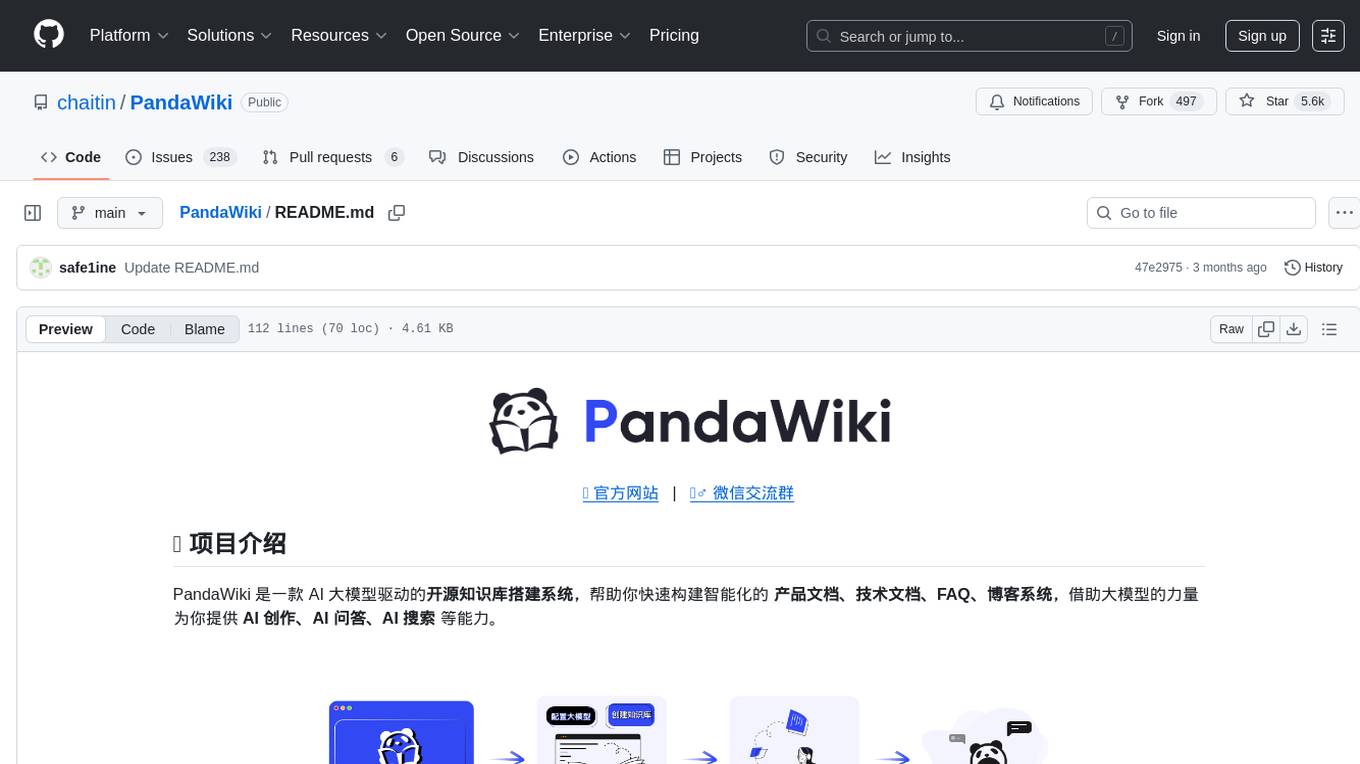
PandaWiki
PandaWiki is a collaborative platform for creating and editing wiki pages. It allows users to easily collaborate on documentation, knowledge sharing, and information dissemination. With features like version control, user permissions, and rich text editing, PandaWiki simplifies the process of creating and managing wiki content. Whether you are working on a team project, organizing information for personal use, or building a knowledge base for your organization, PandaWiki provides a user-friendly and efficient solution for creating and maintaining wiki pages.
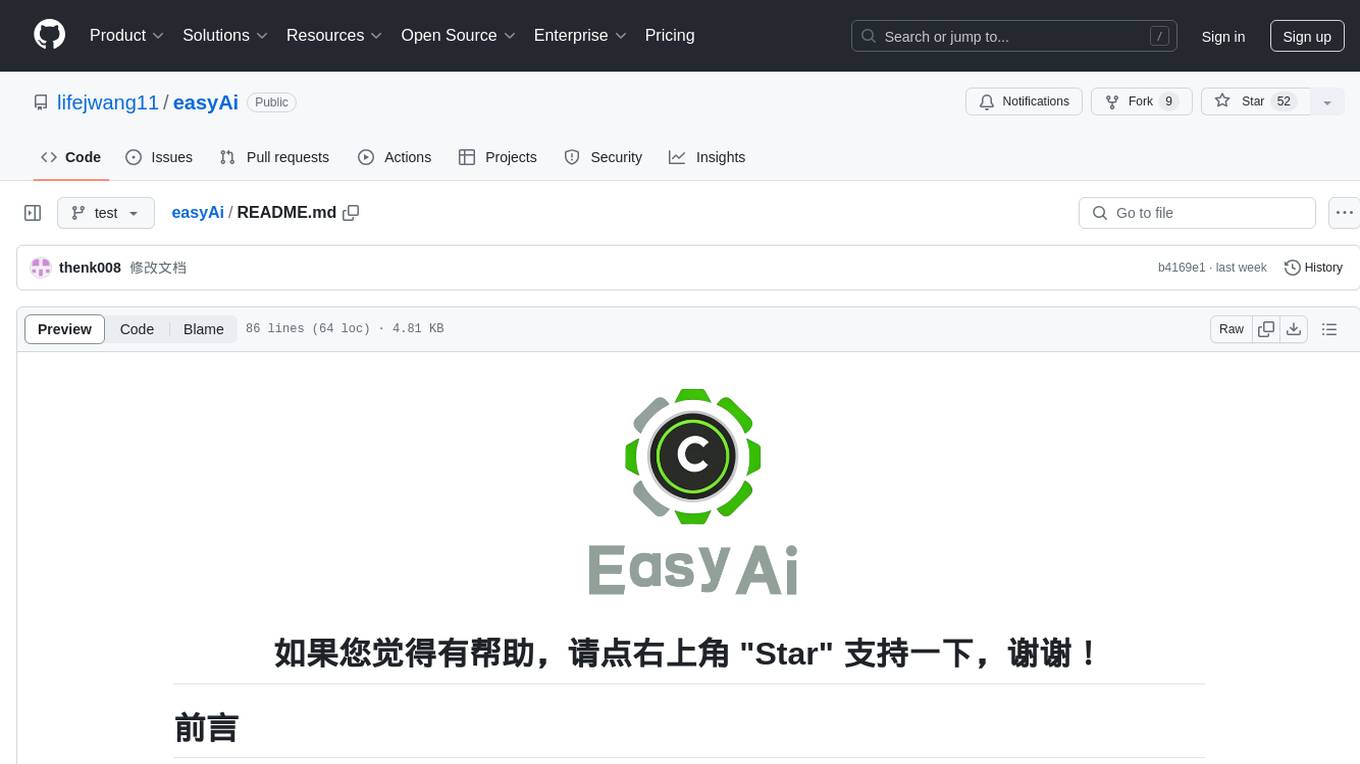
easyAi
EasyAi is a lightweight, beginner-friendly Java artificial intelligence algorithm framework. It can be seamlessly integrated into Java projects with Maven, requiring no additional environment configuration or dependencies. The framework provides pre-packaged modules for image object detection and AI customer service, as well as various low-level algorithm tools for deep learning, machine learning, reinforcement learning, heuristic learning, and matrix operations. Developers can easily develop custom micro-models tailored to their business needs.
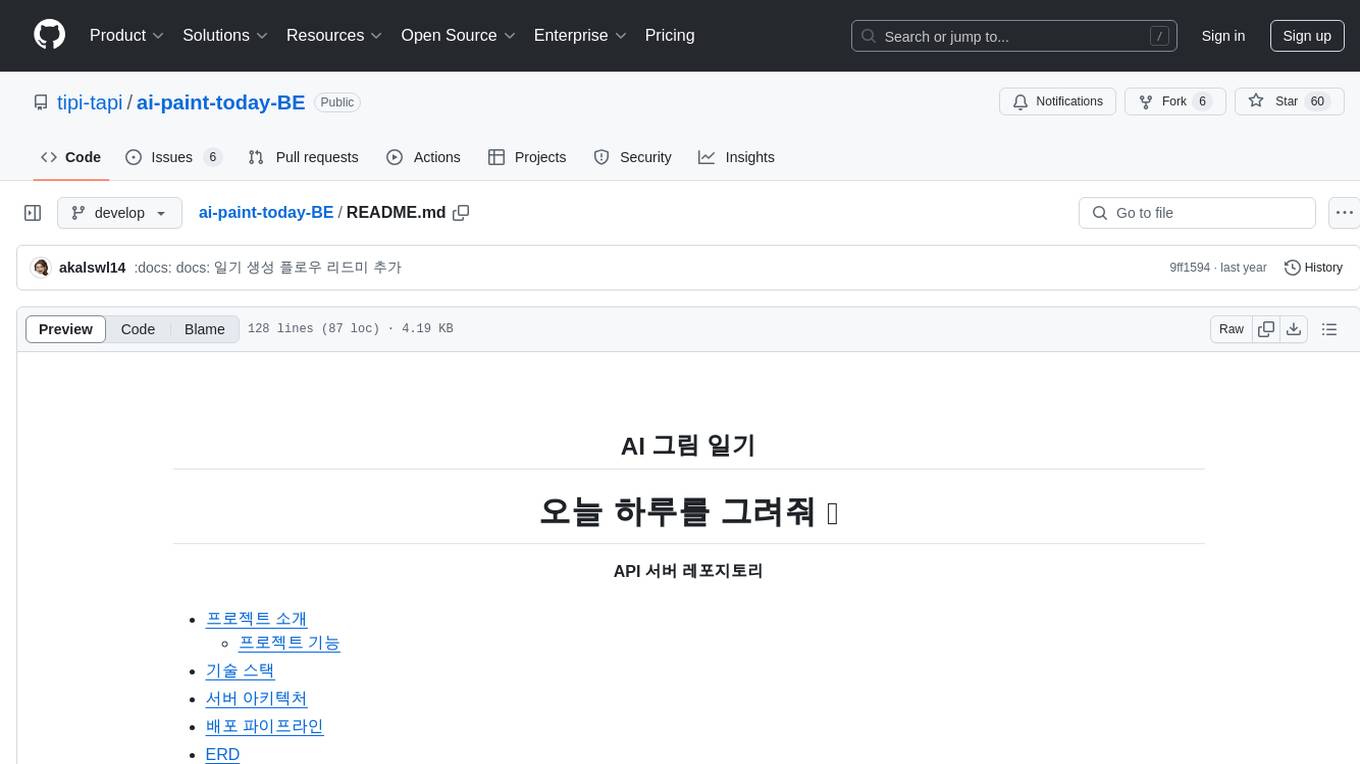
ai-paint-today-BE
AI Paint Today is an API server repository that allows users to record their emotions and daily experiences, and based on that, AI generates a beautiful picture diary of their day. The project includes features such as generating picture diaries from written entries, utilizing DALL-E 2 model for image generation, and deploying on AWS and Cloudflare. The project also follows specific conventions and collaboration strategies for development.
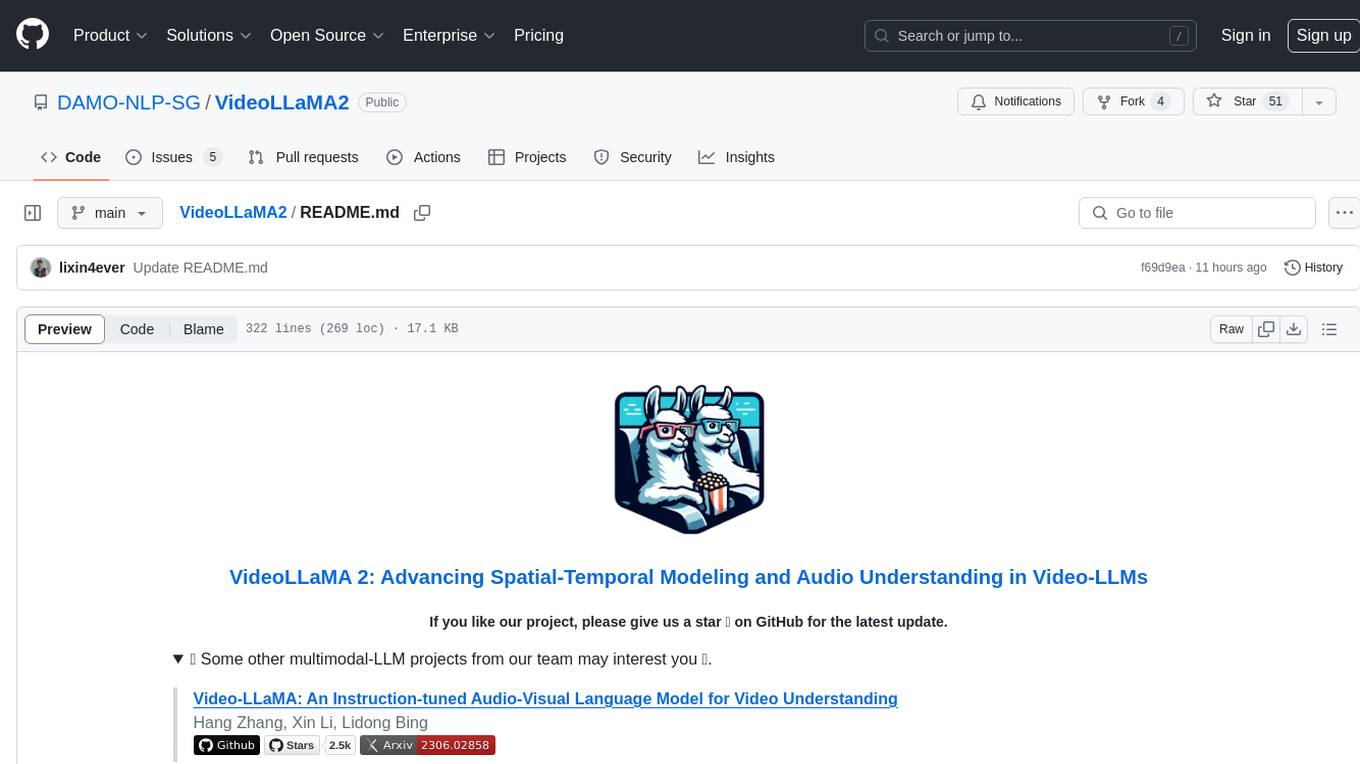
VideoLLaMA2
VideoLLaMA 2 is a project focused on advancing spatial-temporal modeling and audio understanding in video-LLMs. It provides tools for multi-choice video QA, open-ended video QA, and video captioning. The project offers model zoo with different configurations for visual encoder and language decoder. It includes training and evaluation guides, as well as inference capabilities for video and image processing. The project also features a demo setup for running a video-based Large Language Model web demonstration.
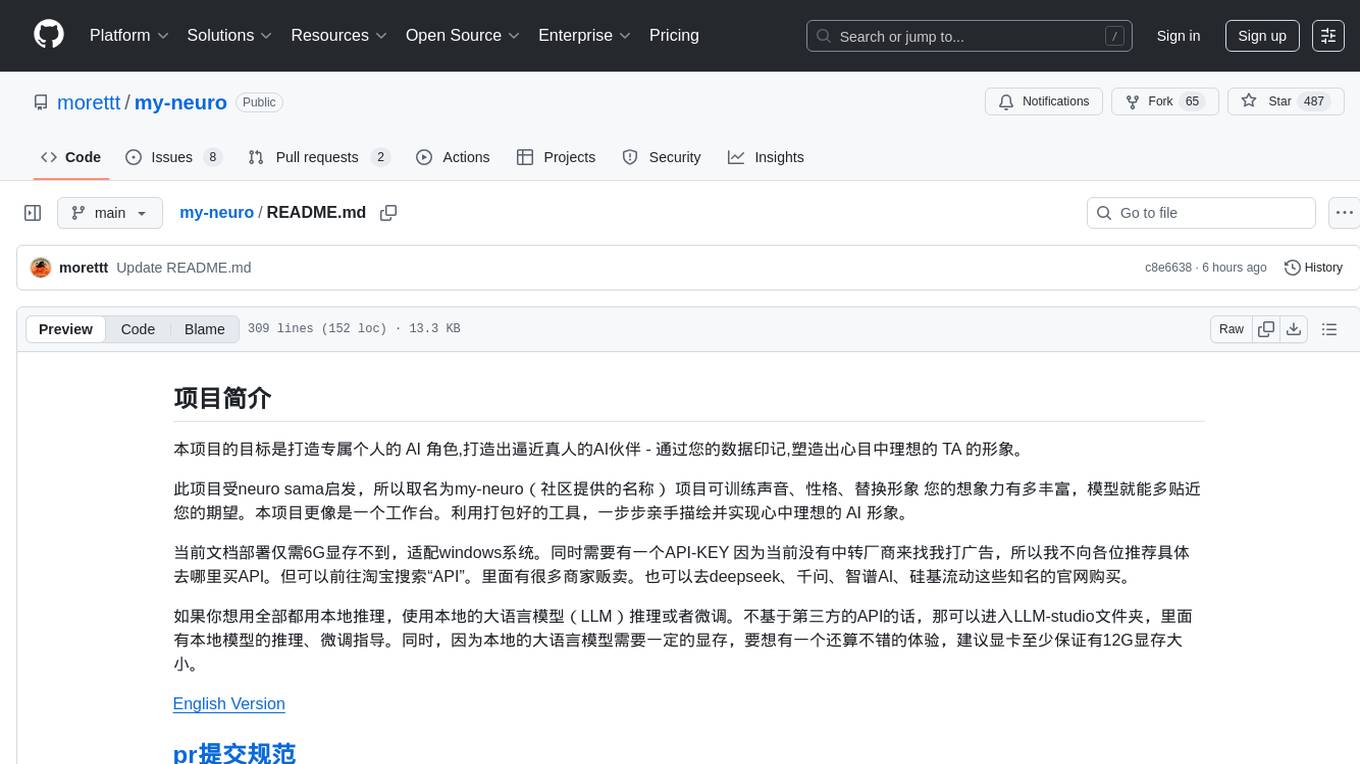
my-neuro
The project aims to create a personalized AI character, a lifelike AI companion - shaping the ideal image of TA in your mind through your data imprint. The project is inspired by neuro sama, hence named my-neuro. The project can train voice, personality, and replace images. It serves as a workspace where you can use packaged tools to step by step draw and realize the ideal AI image in your mind. The deployment of the current document requires less than 6GB of VRAM, compatible with Windows systems, and requires an API-KEY. The project offers features like low latency, real-time interruption, emotion simulation, visual capabilities integration, voice model training support, desktop control, live streaming on platforms like Bilibili, and more. It aims to provide a comprehensive AI experience with features like long-term memory, AI customization, and emotional interactions.

ChatGPT-On-CS
This project is an intelligent dialogue customer service tool based on a large model, which supports access to platforms such as WeChat, Qianniu, Bilibili, Douyin Enterprise, Douyin, Doudian, Weibo chat, Xiaohongshu professional account operation, Xiaohongshu, Zhihu, etc. You can choose GPT3.5/GPT4.0/ Lazy Treasure Box (more platforms will be supported in the future), which can process text, voice and pictures, and access external resources such as operating systems and the Internet through plug-ins, and support enterprise AI applications customized based on their own knowledge base.
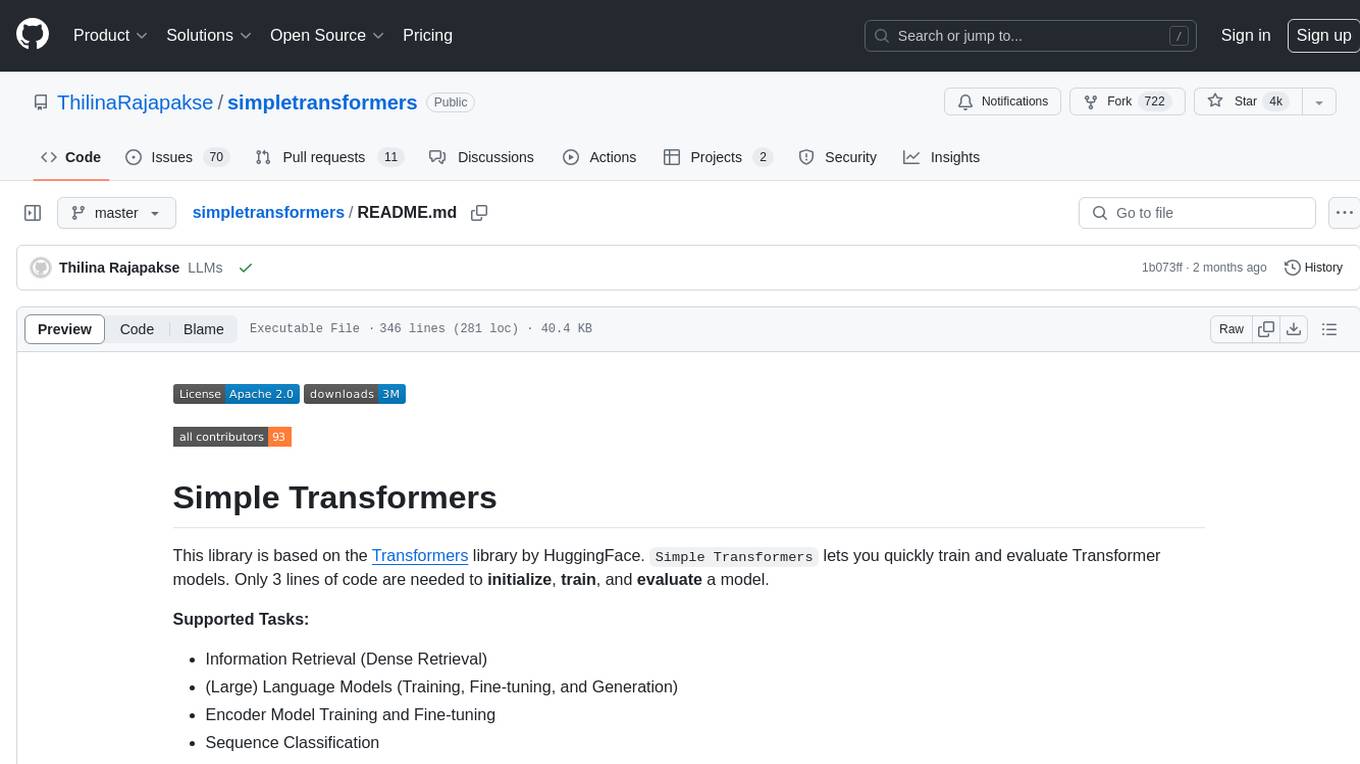
simpletransformers
Simple Transformers is a library based on the Transformers library by HuggingFace, allowing users to quickly train and evaluate Transformer models with only 3 lines of code. It supports various tasks such as Information Retrieval, Language Models, Encoder Model Training, Sequence Classification, Token Classification, Question Answering, Language Generation, T5 Model, Seq2Seq Tasks, Multi-Modal Classification, and Conversational AI.
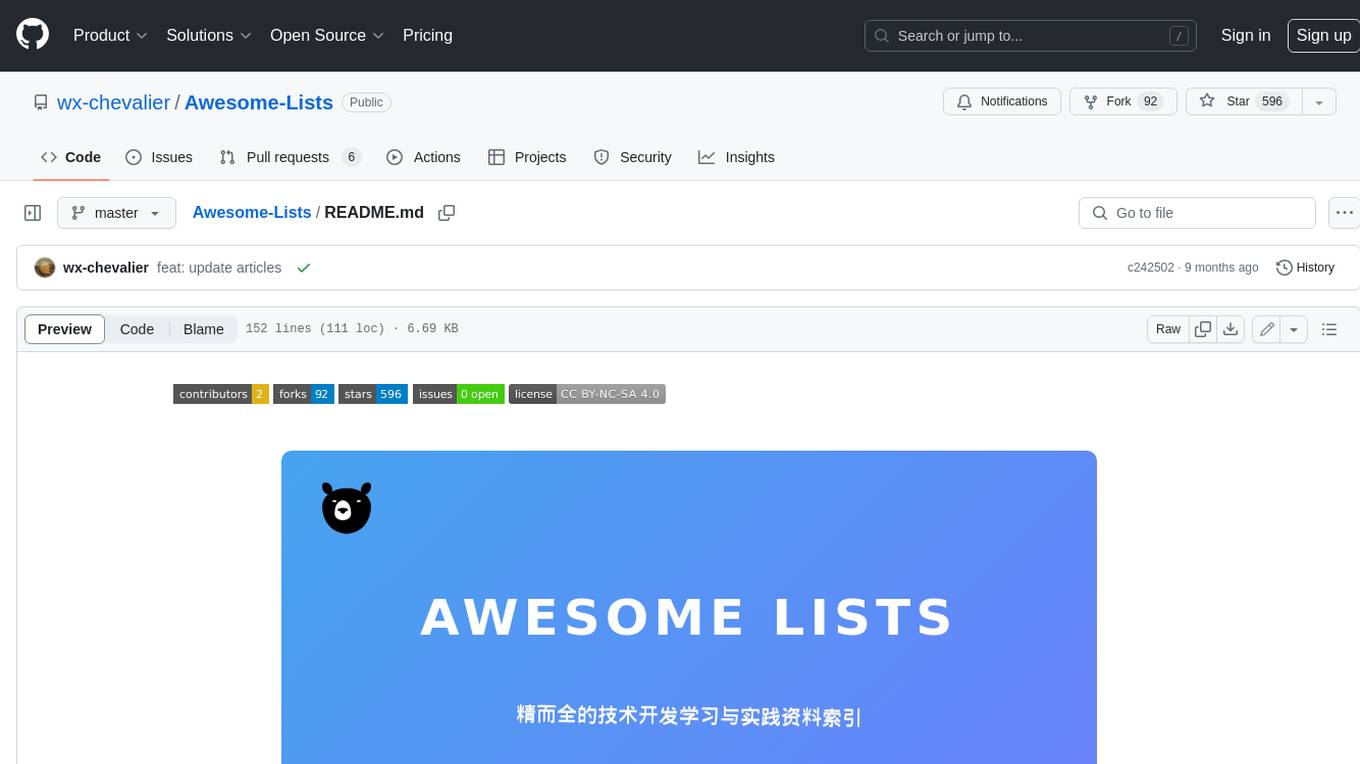
Awesome-Lists
Awesome-Lists is a curated list of awesome lists across various domains of computer science and beyond, including programming languages, web development, data science, and more. It provides a comprehensive index of articles, books, courses, open source projects, and other resources. The lists are organized by topic and subtopic, making it easy to find the information you need. Awesome-Lists is a valuable resource for anyone looking to learn more about a particular topic or to stay up-to-date on the latest developments in the field.
For similar tasks

MING
MING is an open-sourced Chinese medical consultation model fine-tuned based on medical instructions. The main functions of the model are as follows: Medical Q&A: answering medical questions and analyzing cases. Intelligent consultation: giving diagnosis results and suggestions after multiple rounds of consultation.
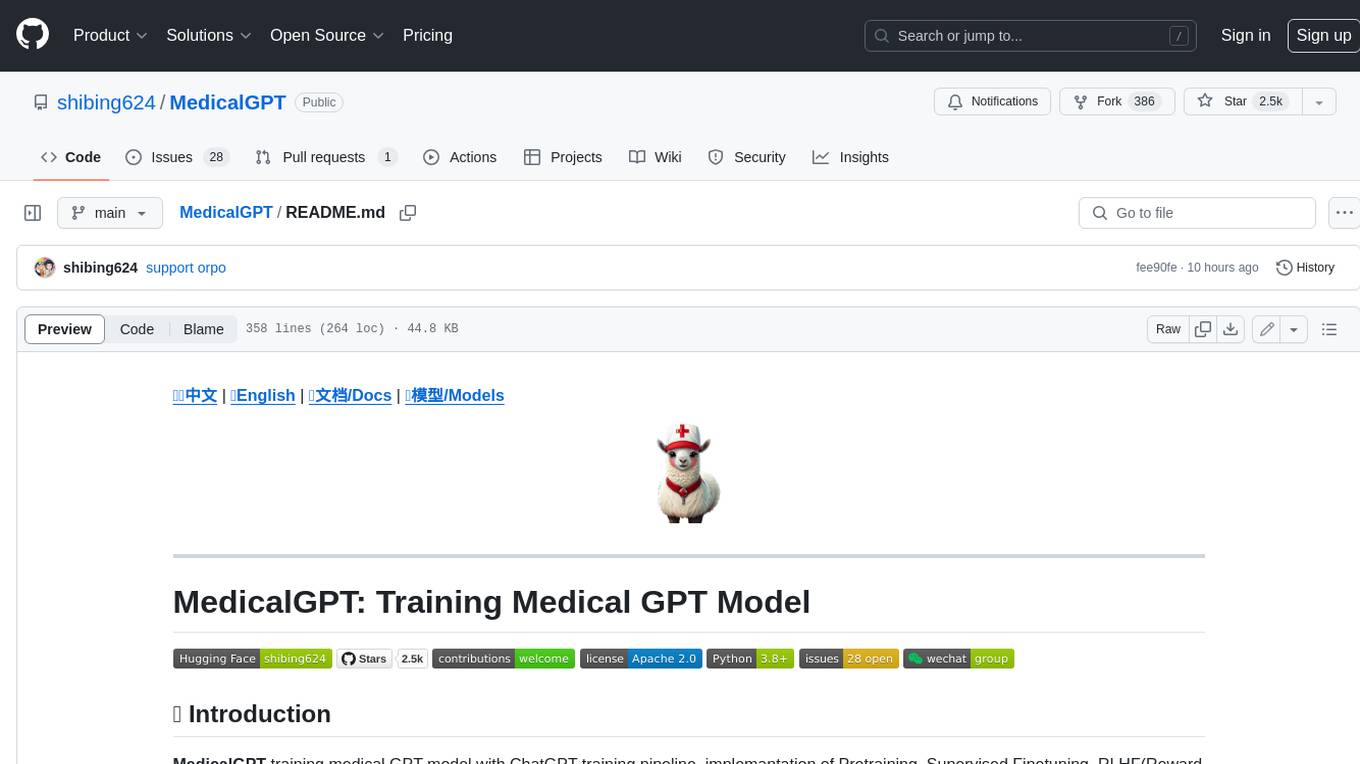
MedicalGPT
MedicalGPT is a training medical GPT model with ChatGPT training pipeline, implement of Pretraining, Supervised Finetuning, RLHF(Reward Modeling and Reinforcement Learning) and DPO(Direct Preference Optimization).
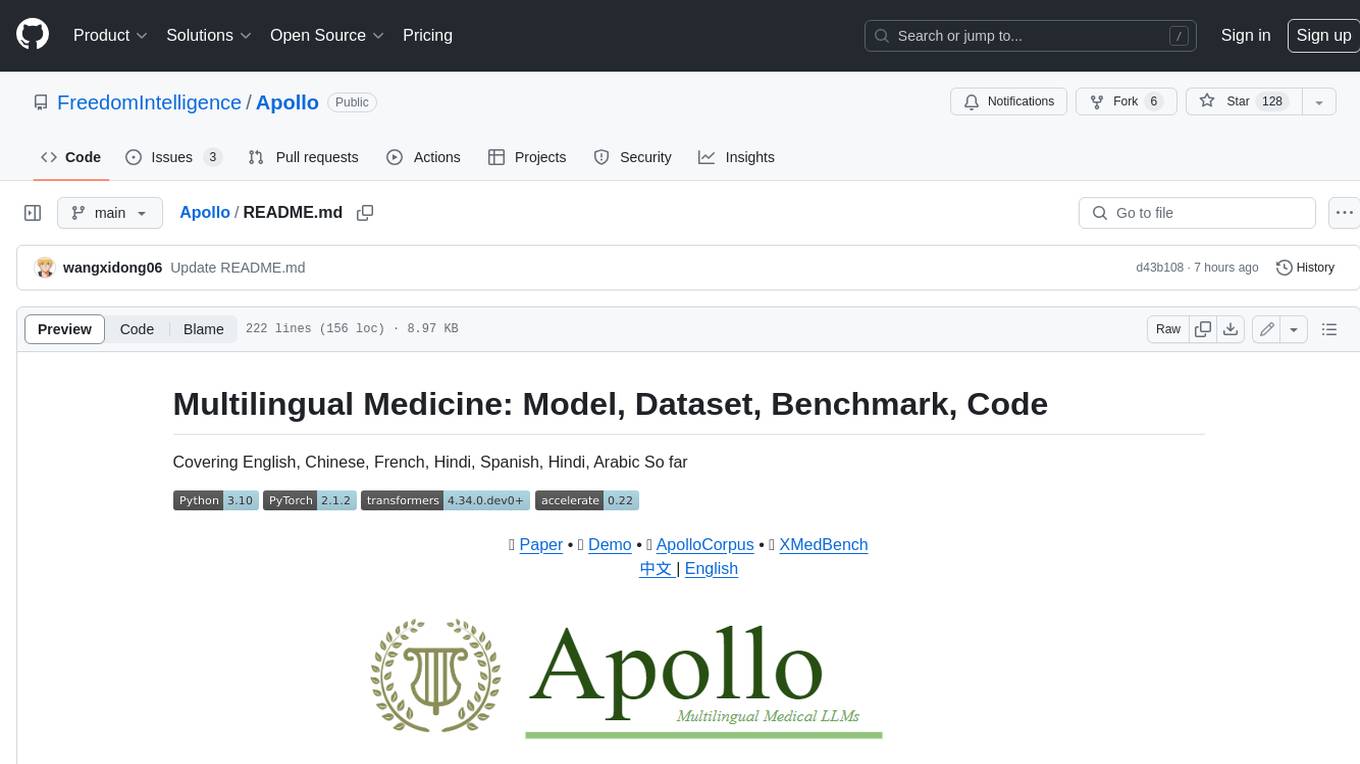
Apollo
Apollo is a multilingual medical LLM that covers English, Chinese, French, Hindi, Spanish, Hindi, and Arabic. It is designed to democratize medical AI to 6B people. Apollo has achieved state-of-the-art results on a variety of medical NLP tasks, including question answering, medical dialogue generation, and medical text classification. Apollo is easy to use and can be integrated into a variety of applications, making it a valuable tool for healthcare professionals and researchers.
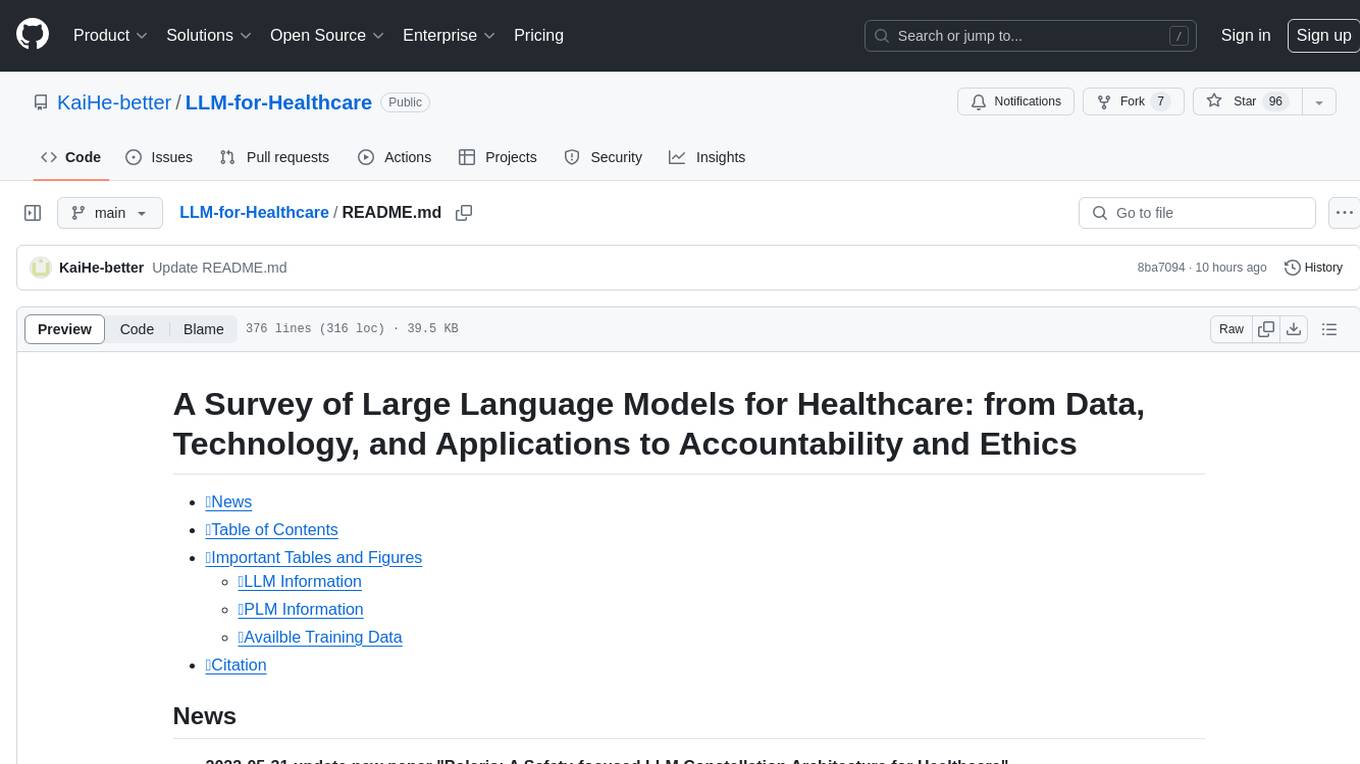
LLM-for-Healthcare
The repository 'LLM-for-Healthcare' provides a comprehensive survey of large language models (LLMs) for healthcare, covering data, technology, applications, and accountability and ethics. It includes information on various LLM models, training data, evaluation methods, and computation costs. The repository also discusses tasks such as NER, text classification, question answering, dialogue systems, and generation of medical reports from images in the healthcare domain.
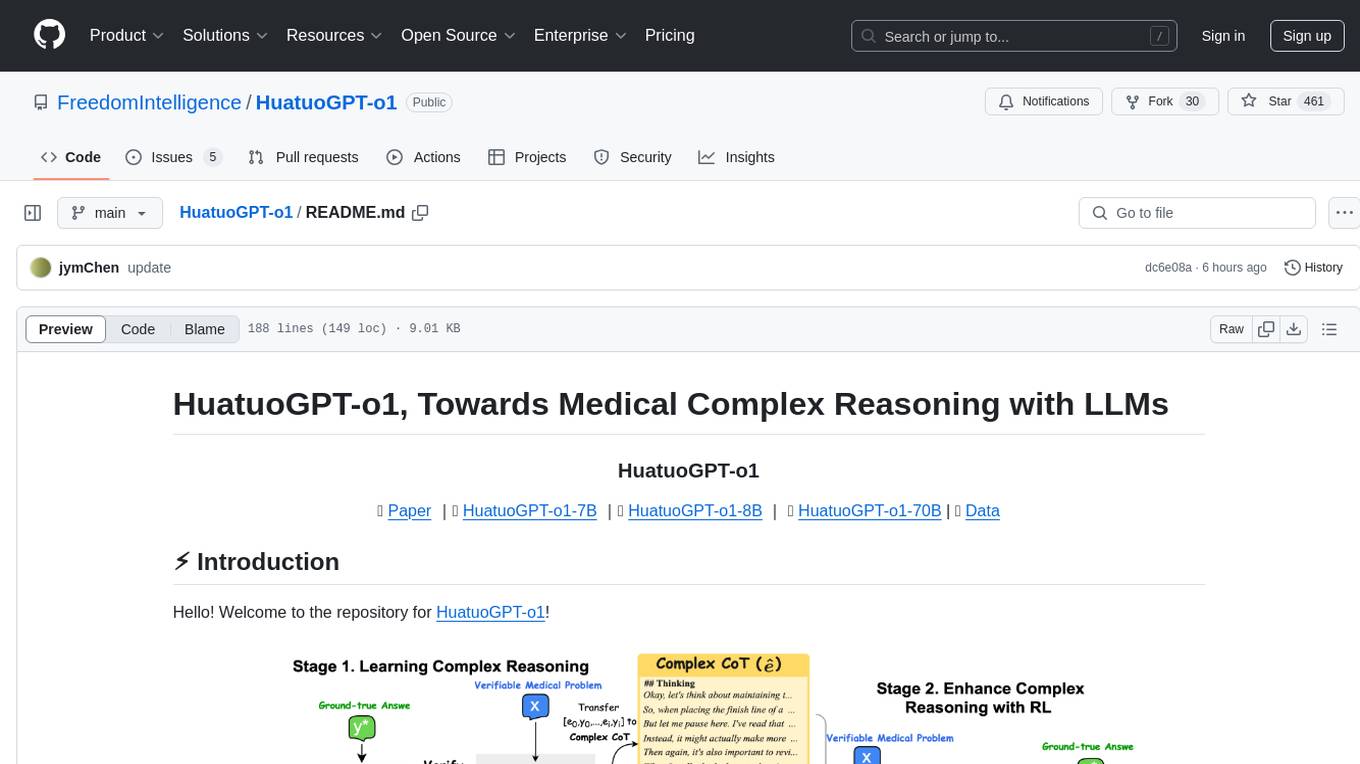
HuatuoGPT-o1
HuatuoGPT-o1 is a medical language model designed for advanced medical reasoning. It can identify mistakes, explore alternative strategies, and refine answers. The model leverages verifiable medical problems and a specialized medical verifier to guide complex reasoning trajectories and enhance reasoning through reinforcement learning. The repository provides access to models, data, and code for HuatuoGPT-o1, allowing users to deploy the model for medical reasoning tasks.
For similar jobs

MING
MING is an open-sourced Chinese medical consultation model fine-tuned based on medical instructions. The main functions of the model are as follows: Medical Q&A: answering medical questions and analyzing cases. Intelligent consultation: giving diagnosis results and suggestions after multiple rounds of consultation.
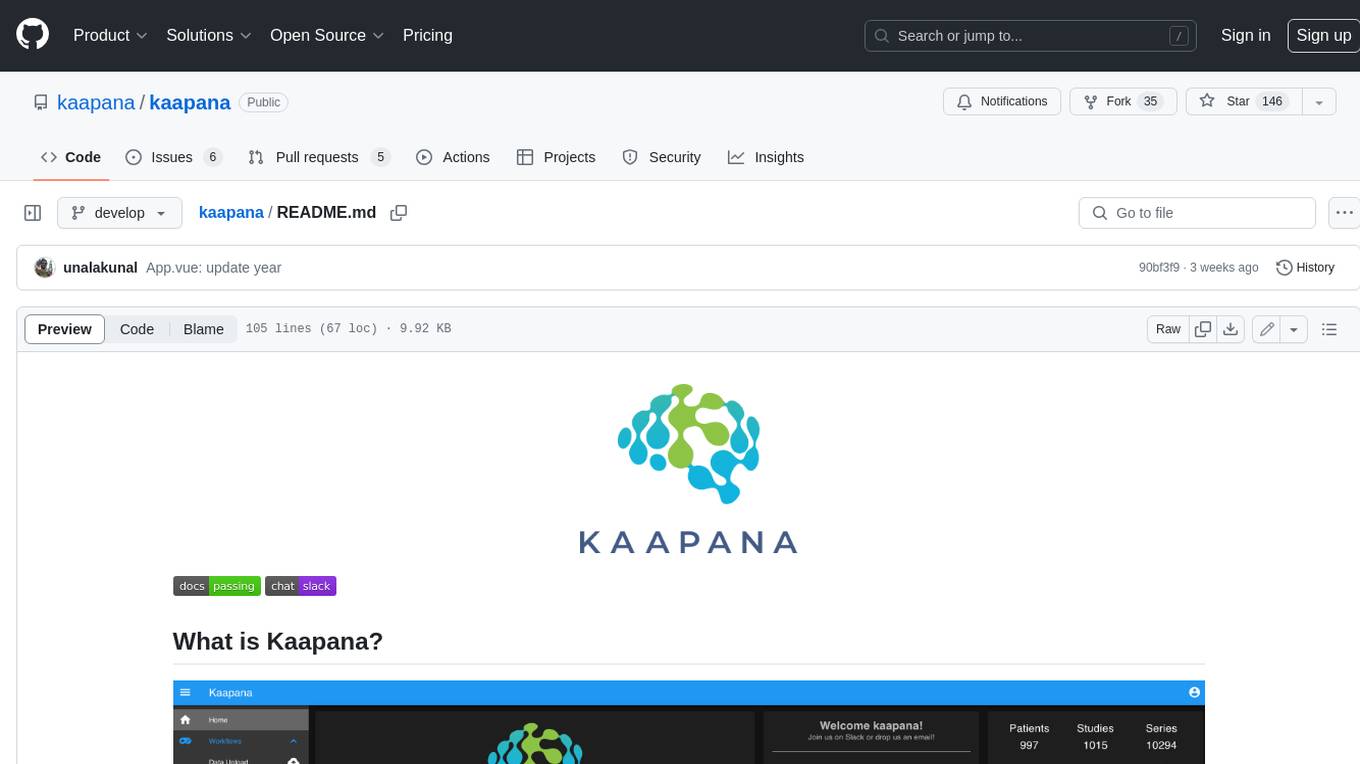
kaapana
Kaapana is an open-source toolkit for state-of-the-art platform provisioning in the field of medical data analysis. The applications comprise AI-based workflows and federated learning scenarios with a focus on radiological and radiotherapeutic imaging. Obtaining large amounts of medical data necessary for developing and training modern machine learning methods is an extremely challenging effort that often fails in a multi-center setting, e.g. due to technical, organizational and legal hurdles. A federated approach where the data remains under the authority of the individual institutions and is only processed on-site is, in contrast, a promising approach ideally suited to overcome these difficulties. Following this federated concept, the goal of Kaapana is to provide a framework and a set of tools for sharing data processing algorithms, for standardized workflow design and execution as well as for performing distributed method development. This will facilitate data analysis in a compliant way enabling researchers and clinicians to perform large-scale multi-center studies. By adhering to established standards and by adopting widely used open technologies for private cloud development and containerized data processing, Kaapana integrates seamlessly with the existing clinical IT infrastructure, such as the Picture Archiving and Communication System (PACS), and ensures modularity and easy extensibility.

MedicalGPT
MedicalGPT is a training medical GPT model with ChatGPT training pipeline, implement of Pretraining, Supervised Finetuning, RLHF(Reward Modeling and Reinforcement Learning) and DPO(Direct Preference Optimization).
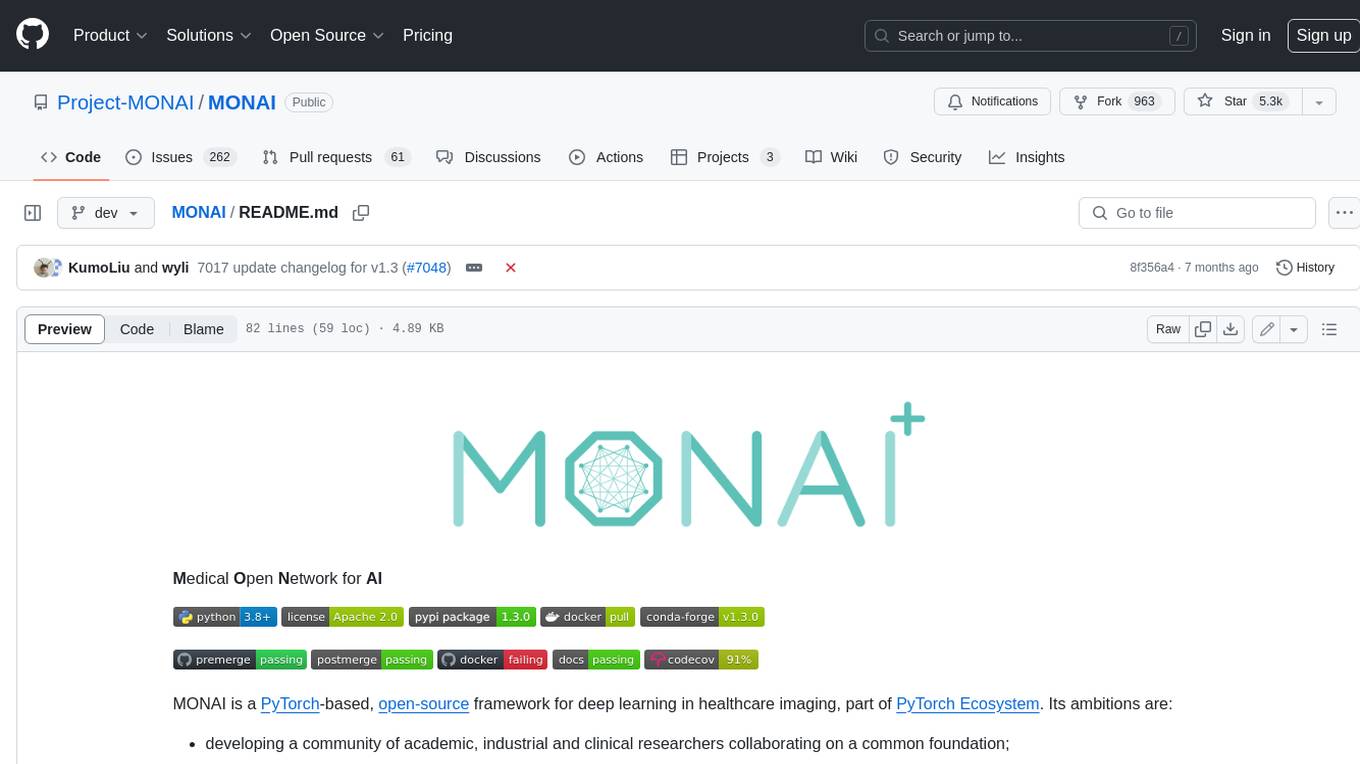
MONAI
MONAI is a PyTorch-based, open-source framework for deep learning in healthcare imaging. It provides a comprehensive set of tools for medical image analysis, including data preprocessing, model training, and evaluation. MONAI is designed to be flexible and easy to use, making it a valuable resource for researchers and developers in the field of medical imaging.

Apollo
Apollo is a multilingual medical LLM that covers English, Chinese, French, Hindi, Spanish, Hindi, and Arabic. It is designed to democratize medical AI to 6B people. Apollo has achieved state-of-the-art results on a variety of medical NLP tasks, including question answering, medical dialogue generation, and medical text classification. Apollo is easy to use and can be integrated into a variety of applications, making it a valuable tool for healthcare professionals and researchers.
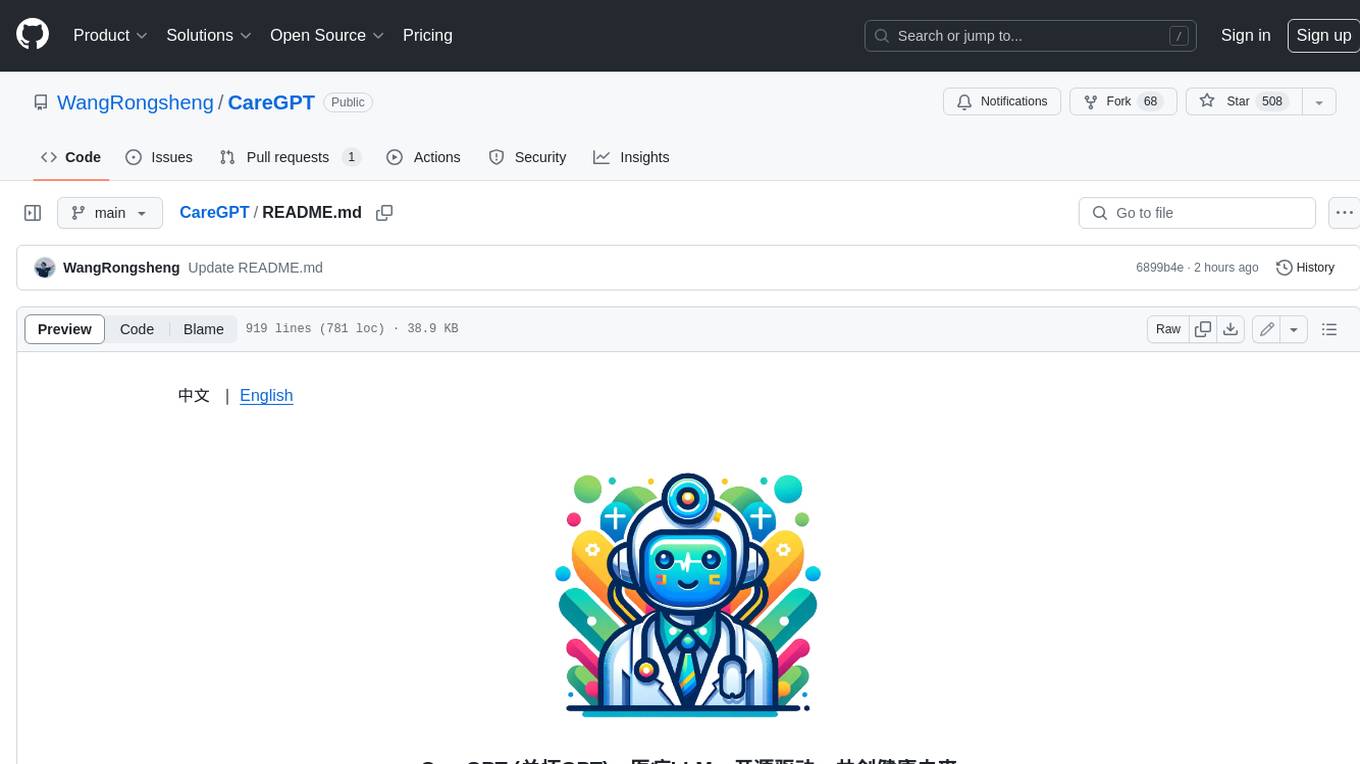
CareGPT
CareGPT is a medical large language model (LLM) that explores medical data, training, and deployment related research work. It integrates resources, open-source models, rich data, and efficient deployment methods. It supports various medical tasks, including patient diagnosis, medical dialogue, and medical knowledge integration. The model has been fine-tuned on diverse medical datasets to enhance its performance in the healthcare domain.
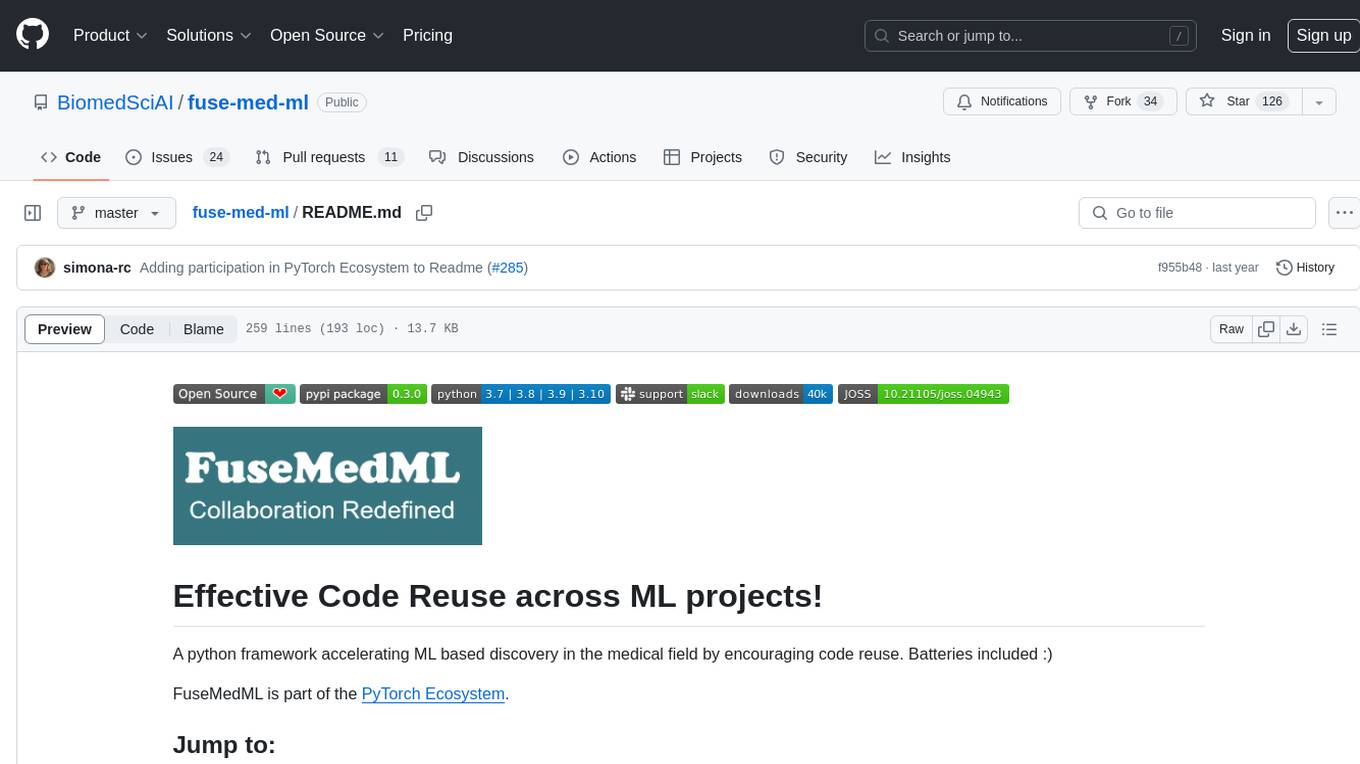
fuse-med-ml
FuseMedML is a Python framework designed to accelerate machine learning-based discovery in the medical field by promoting code reuse. It provides a flexible design concept where data is stored in a nested dictionary, allowing easy handling of multi-modality information. The framework includes components for creating custom models, loss functions, metrics, and data processing operators. Additionally, FuseMedML offers 'batteries included' key components such as fuse.data for data processing, fuse.eval for model evaluation, and fuse.dl for reusable deep learning components. It supports PyTorch and PyTorch Lightning libraries and encourages the creation of domain extensions for specific medical domains.
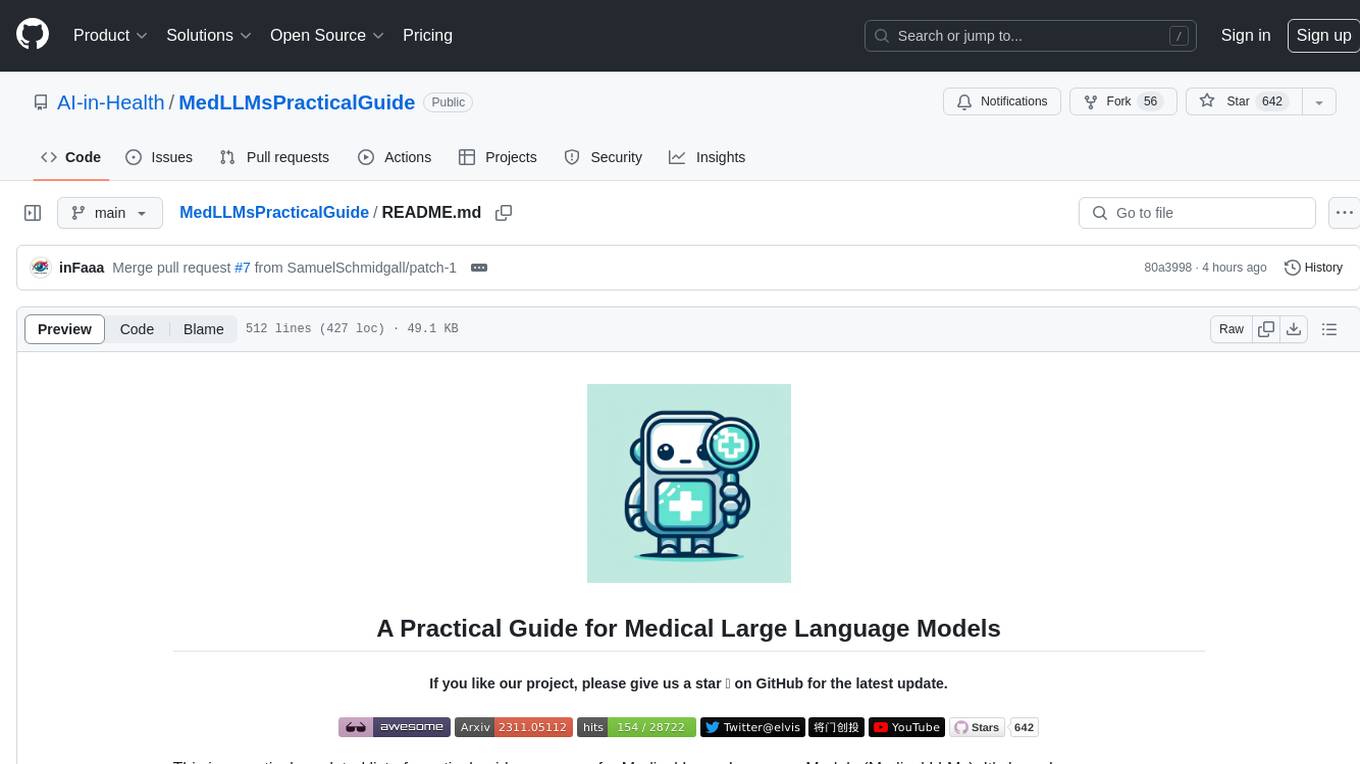
MedLLMsPracticalGuide
This repository serves as a practical guide for Medical Large Language Models (Medical LLMs) and provides resources, surveys, and tools for building, fine-tuning, and utilizing LLMs in the medical domain. It covers a wide range of topics including pre-training, fine-tuning, downstream biomedical tasks, clinical applications, challenges, future directions, and more. The repository aims to provide insights into the opportunities and challenges of LLMs in medicine and serve as a practical resource for constructing effective medical LLMs.





